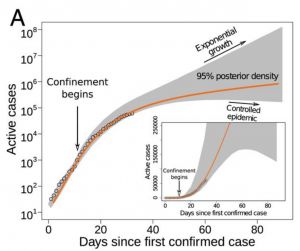“Este problema que presentan los modelos tradicionales se puede atenuar con más y mejores datos, y con modelos testados en distintos contextos, pero no se puede resolver completamente”, añaden los autores. En los modelos tradicionales de la epidemiología se divide a la población en cierto número de clases o “compartimentos”: individuos susceptibles, infectados, recuperados, y varias otras dependiendo de cada caso particular. Estos “modelos de tipo SIR”, por las iniciales de las clases básicas anteriores, capturan las características fundamentales de la dinámica de un proceso de propagación de infecciones. “Pero en este estudio hemos mostrado que los datos empíricos no pueden predecir el curso futuro de la epidemia, cuándo llegará a su máximo, si habrá o no un repunte, cuál será el número final de fallecidos o si el confinamiento tendrá el efecto deseado”, detallan.
“Mediante los datos oficiales publicados por el Ministerio de Sanidad y las comunidades autónomas, con reportes diarios de casos confirmados, pacientes recuperados y fallecidos, obtenemos un conjunto de parámetros compatibles con las observaciones mediante métodos de ajuste estadístico”, indica la investigadora. “Si bien el ajuste es excelente para el conjunto de España y sus Comunidades Autónomas, la sensibilidad de los modelos SIR a variaciones en el valor de los parámetros, como la tasa de infección del virus, impide la predicción a medio y largo plazo”, añaden. “Por desgracia, este resultado también implica que no podemos determinar en estos momentos la magnitud ni la duración de la segunda ola”, indican.
“Esta sensibilidad es análoga a la que se observa en los sistemas caóticos, donde dos condiciones iniciales ligeramente distintas divergen exponencialmente rápido. Este principio subyace a la imposibilidad de predecir el tiempo que hará más allá de unos pocos días vista. Es decir, el hecho de que un modelo epidemiológico de tipo SIR (que entraña un crecimiento exponencialmente rápido de las variables en la etapa de expansión de la epidemia) sea capaz de reproducir el pasado no implica que sea capaz de predecir el futuro”, argumenta los autores.
Proceedings of the National Academy of Sciences (PNAS). The turning point and end of an expanding epidemic cannot be precisely forecast. Mario Castro, Saúl Ares, José A. Cuesta y Susanna Manrubia.
CSIC Comunicación






